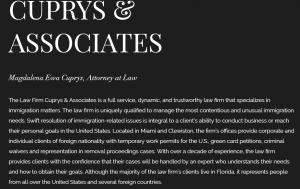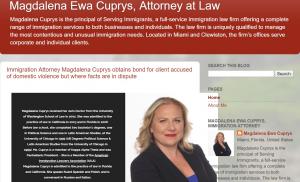As part of a series of articles, Immigration Attorney Magdalena Cuprys publishes review of Paralegal employment
Paralegals must undergo specific education and training, and are utilized by many different employers, explains Magdalena Cuprys in her most recent article.
Cuprys & Associates (N/A:N/A)
Paralegal Training and Experience
Paralegals are a key component of an efficient law practice, and their role continues to expand. In fact, the job outlook (unlike for many other professions) is quite bright. Paralegals must undergo specific education, training and/or work experience and are utilized by many different employers, including individual practitioners, law firms, corporations and various government agencies. Different certifications and credentials are available to classify the Paralegal experience. In the traditional law firm setting, the Paralegal's time is primarily spent on substantive legal work which is billed to clients at market rates, similar to other professional staff, but at a significantly lower rate than would be charged had an Attorney been solely utilized to handle such work, as was standard in the past. This hourly billing option distinguishes Paralegals from other non-lawyer staff members. However, many legal or quasi-legal organizations do not specifically bill for Paralegal time, such as Real Estate Title Firms, Immigration Law Firms, or Bankruptcy practices. Thus, in many organizations, time spent on administrative or clerical functions is not billable to the client’s case.
Due to Ethical Rules, Paralegals will never completely replace Lawyers
Only licensed attorneys may give “legal advice” to clients, and ethical rules in all U.S. States are uniform that Paralegals are strictly prohibited from doing so. Paralegals also are prohibited from directly accepting a client’s case, setting any fees, or representing a client in court (unless specifically authorized by the court, see below). All U.S. States require attorneys to be licensed and most have regulations imposing strict penalties for anyone who engages in the unauthorized practice of law. In fact, there are rules requiring appropriate supervision of Paralegals.
The largest employers of Paralegals within the legal profession are, naturally, law firms. However, businesses, corporations and government are large Paralegal employers as well. Paralegals are found in every area work of legal practice, ranging from bankruptcy law practice, estate planning, litigation, personal injury law, and immigration.
Strong Need for Paralegals Continues
Doomsday talk persisted in the recent past that technology was set to fully replace the Paralegal industry as a result of software upgrades and automated advances. At least one major law firm today uses highly sophisticated software for research previously conducted by Paralegals and even Attorneys. Many predicted the end of the Paralegal profession. The Associated Press issued a report in 2013 which claimed that an increasing number of Attorneys were using software and other technologies to do the work previously performed by Paralegal staff. It is certainly true that such software and technologies can enable solo practitioners to handle most or all of their workload without the need for any Paralegal. However, in 2014 the Bureau of Labor Statistics forecasted a continuing positive growth rate of 8 percent growth from 2014 to 2024, and then in 2016 readjusted that figure to a 15 percent growth from 2016 to 2026 – again documenting continued growth from its original projection.
This information is confirmed by the Occupational Information Network (O*NET), an online database that contains hundreds of occupational definitions to help job seekers, businesses and workforce development professionals to understand educational and occupational trends in today’s economy in the United States. O*NET was developed under the sponsorship of the US Department of Labor/Employment and Training Administration (USDOL/ETA) in the 1990s. According to O*NET, the future outlook for Paralegals is bright.
About Magdalena Ewa Cuprys
Magdalena Cuprys is the principal of Serving Immigrants, a full-service immigration law firm offering a complete range of immigration services to both businesses and individuals. The law firm is uniquely qualified to manage the most contentious and unusual immigration needs.
Law Firm Website: http://www.servingimmigrants.com
Website: http://tuabogadadice.com/
Blog: https://magdalenacuprysblog.blogspot.com/
Attorney Profile: https://solomonlawguild.com/magdalena-e-cuprys%2C-esq
Member for the American Immigration Lawyers Association (AILA), see http://www.ailalawyer.com/english/AttorneyDetail.aspx?P=19738&A=40169
Lawyer Directory: https://www.lawyer.com/magdalena-ewa-cuprys.html
LinkedIn Profile: https://www.linkedin.com/in/magdalena-cuprys-265534a/
Tiffany Ramirez
Cuprys and Associates, Serving Immigrants
+ + +1 305-924-1133
email us here
Visit us on social media:
Facebook
LinkedIn
What is a Paralegal? - Brief video lecture by David Jaroszewski, Director of Paralegal Studies at Lee College, Baytown, Texas.
Legal Disclaimer:
EIN Presswire provides this news content "as is" without warranty of any kind. We do not accept any responsibility or liability for the accuracy, content, images, videos, licenses, completeness, legality, or reliability of the information contained in this article. If you have any complaints or copyright issues related to this article, kindly contact the author above.



